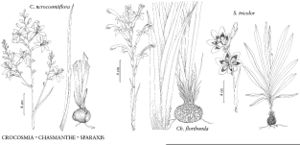Crocosmia ×crocosmiiflora
Trans. Roy. Soc. South Africa 20: 264. 1932.
Plants 50–100 cm; corms globose, 15–25 mm diam. Stems usually 2–4-branched, often curving distally. Leaves 5–8, mostly basal, basal much larger than cauline; blade lanceolate, 8–20 mm wide. Spikes: spathes 6–10 mm, apex brown, dry, outer apex acute, inner apex 2-keeled, bifurcate; flowers distichous. Tepals spreading, dorsal weakly arcuate, paler in center, sometimes with darker markings at base, subequal, outer whorl slightly larger than inner, 16–25 × 6–9 mm; perianth tube 12–15 mm; filaments 15–22 mm; anthers 6–8 mm; ovary oblong, ca. 3 mm; style arching over stamens, branching at or shortly beyond anther apices; branches ca. 4 mm, apically bifid. Capsules ca. 8 mm. Seeds blackish, ca. 2.5 mm diam. (or aborted and plants partly or completely sterile). 2n = 22.
Phenology: Flowering mainly Jul–Aug.
Habitat: Roadsides, thickets, forest margins
Elevation: 50 m
Distribution
Introduced; B.C., Calif., Fla., N.C., Oreg., S.C., Tex., Wash., South Africa.
Discussion
Crocosmia ×crocosmiiflora is an escape from cultivation.
Selected References
None.
